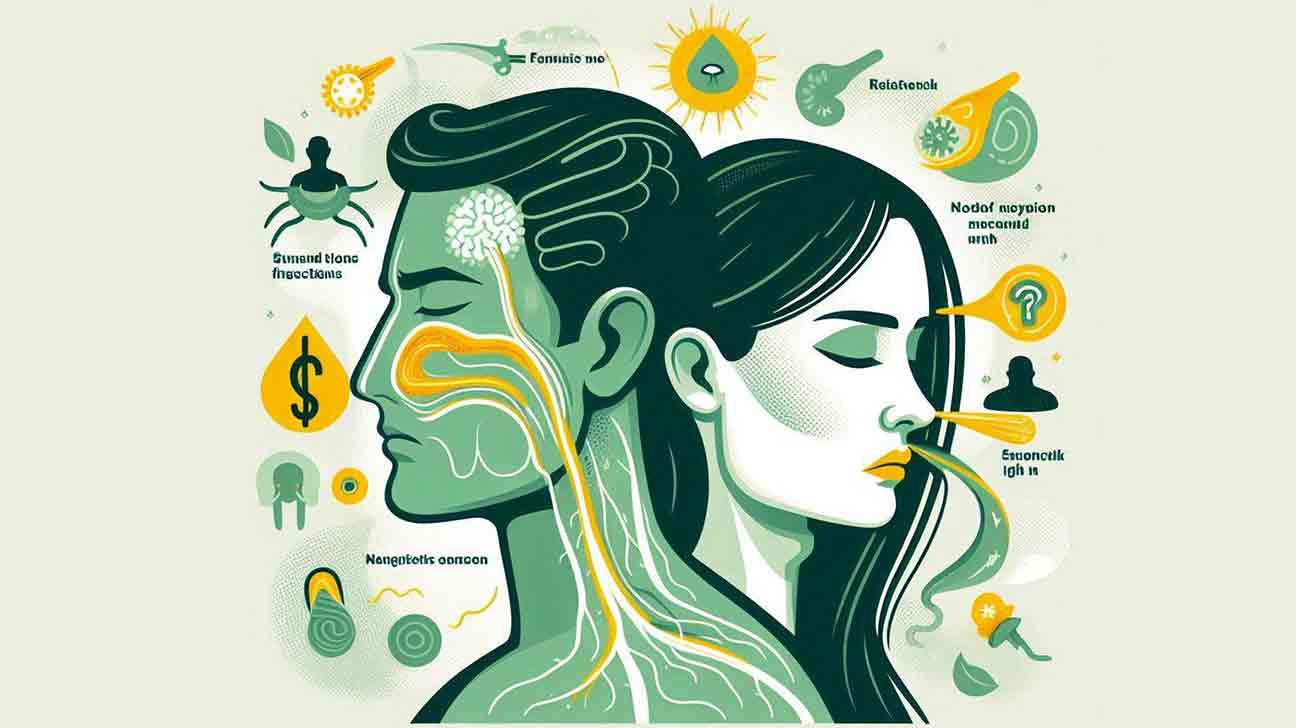A sinus infection, also known as sinusitis, can be contagious depending on its cause. Sinus infections are typically the result of inflammation in the sinus cavities, which can be triggered by different factors. Whether or not it’s contagious depends on the underlying cause of the infection. Let’s break this down in more detail.
sinus infection contagious
Causes of Sinus Infection and Contagiousness
- Viral Sinus Infection (Most Common)
- Contagious?: Yes
- Explanation: Viral sinus infections are usually caused by common cold viruses such as rhinovirus, influenza, or parainfluenza. When the virus infects the sinuses, it leads to inflammation and mucus buildup. The virus itself can spread to others through airborne droplets when you cough or sneeze, making it contagious. However, it’s important to note that while the virus can spread, it doesn’t always lead to sinusitis in others—it may just cause a cold or similar symptoms.
- Bacterial Sinus Infection
- Contagious?: No
- Explanation: Bacterial sinus infections often occur after a viral infection when bacteria start to grow in the congested sinuses. These infections are generally not contagious because the bacteria are contained within the sinuses. However, if someone develops a sinus infection due to an underlying viral infection, the initial virus can still be contagious, but the bacterial component itself is not.
- Allergic Sinusitis
- Contagious?: No
- Explanation: Allergic sinus infections occur when allergens like pollen, dust, or mold cause sinus inflammation. Since this type of sinusitis is triggered by an allergic reaction and not an infection, it is not contagious.
- Fungal Sinus Infection
- Contagious?: No
- Explanation: Fungal sinus infections are rare and typically occur in people with weakened immune systems. These infections are caused by fungi growing in the sinuses, and they are not spread from person to person.
How Sinus Infections Spread (When Contagious)
For viral sinus infections, the virus can spread through:
- Airborne droplets: When someone coughs, sneezes, or talks, tiny droplets containing the virus can be inhaled by others.
- Touching contaminated surfaces: If you touch a surface that has the virus on it (like a doorknob or tissue) and then touch your nose, mouth, or eyes, you could become infected.
- Direct contact: Close contact like handshakes, kisses, or sharing personal items can spread the virus.
Symptoms of a Contagious Sinus Infection
The symptoms of sinusitis, whether contagious or not, are generally the same. Common symptoms include:
- Stuffy or runny nose
- Facial pain or pressure
- Headache
- Sore throat
- Cough
- Fever (sometimes)
- Postnasal drip
- Fatigue
In the case of a viral infection, symptoms like coughing, sneezing, and sore throat may also occur, making the infection more likely to spread.
How to Prevent Spreading a Sinus Infection (When Contagious)
If you have a viral sinus infection, you can reduce the risk of spreading it to others by:
- Washing your hands regularly: Use soap and water or hand sanitizer, especially after coughing, sneezing, or blowing your nose.
- Covering your mouth and nose: Use a tissue or the inside of your elbow when coughing or sneezing.
- Avoiding close contact: Stay away from others, especially vulnerable populations like the elderly or immunocompromised individuals, while you are sick.
- Disinfecting surfaces: Clean frequently-touched objects like doorknobs, phones, and countertops to reduce the spread of germs.
When to Seek Medical Attention
If you’re experiencing sinus infection symptoms that persist for more than 10 days, are severe, or recur frequently, it’s important to consult with a healthcare provider. Bacterial sinus infections may require antibiotics, while viral infections are often treated with rest, fluids, and over-the-counter medications.
Final Thoughts
In summary, viral sinus infections are contagious and can be spread to others, whereas bacterial, allergic, and fungal sinus infections are not contagious. If you have sinusitis caused by a virus, it’s essential to take precautions to prevent spreading the virus to others. Always consult with a healthcare provider if you’re unsure about the nature of your sinus infection or if symptoms worsen.

vitacures.comSinus infections can be contagious, but they are not always contagious. Sinus infections are a common health issue affecting millions of people worldwide.
They occur when the sinuses become inflamed due to bacterial, fungal, or viral infections. The symptoms of a sinus infection can be uncomfortable and include headaches, congestion, facial pain, and fever. Many people wonder whether sinus infections are contagious, and the answer is not straightforward.
While sinus infections can be contagious in some cases, they are not always contagious. We will explore the causes of sinus infections, the symptoms, and whether or not they can be transmitted from one person to another.
Are Sinus Infections Contagious
Sinus infections are typically not contagious, as they are usually caused by viruses or bacteria. However, some cases can be spread through close contact with an infected person. It is important to practice good hygiene to prevent the spread of sinus infections.
Are Sinus Infections Contagious?
Sinus infections, also known as sinusitis, are a common condition that can cause discomfort and difficulty breathing. One question that often arises is whether sinus infections are contagious. Let’s delve into this topic to understand more about the contagious nature of sinus infections.
Contagiousness Of Sinus Infections:
- Sinus infections are typically not contagious: This means that you are unlikely to catch a sinus infection from someone who has one. Sinusitis is usually caused by viruses, bacteria, or fungi that are already present in your body or the environment.
- However, certain cases may be contagious: In rare instances, if a sinus infection is caused by a bacterial infection, it could potentially be contagious. Bacterial sinus infections can be transmitted through close contact with respiratory secretions.
- Preventive measures are important: To reduce the risk of spreading any potential contagious sinus infection, it’s essential to practice good hygiene, such as washing hands regularly, covering your mouth when sneezing or coughing, and avoiding close contact with individuals who have respiratory infections.
Understanding the contagiousness of sinus infections can help you take necessary precautions to protect yourself and others. Remember that proper hygiene and preventive measures play a crucial role in minimizing the spread of any potential contagious infections.
Are Sinus Infections Contagious Through Kissing
Sinus infections are typically not contagious through kissing, as they are caused by viruses or bacteria. However, close contact with someone who has a sinus infection can increase the risk of transmission through respiratory droplets. Regular handwashing and avoiding close contact with infected individuals can help prevent the spread.
Are Sinus Infections Contagious Through Kissing?
Sinus infections are a common ailment that can cause discomfort and inconvenience. Many people wonder whether sinus infections can be transmitted through kissing. Let’s delve into this topic to gain a clear understanding.
Sinus Infections And Kissing
- Transmission via Kissing: Sinus infections are typically caused by viruses or bacteria. While it is theoretically possible to transmit certain viruses through kissing, sinus infections are primarily spread through respiratory droplets from coughing, sneezing, or close contact with an infected person. Kissing may not be a common mode of transmission for sinus infections.
- Precautions: It’s essential to practice good hygiene to minimize the risk of transmitting or contracting a sinus infection. This includes washing hands regularly, avoiding close contact with individuals who are sick, and maintaining overall good health to support the immune system.
- Impact of Kissing: While kissing may not be a direct cause of sinus infections, it’s important to be mindful of one’s health and that of their partner. If one person is experiencing symptoms of a sinus infection, it may be advisable to refrain from intimate contact to prevent potential transmission of the infection.
Sinus infections are typically not directly contagious through kissing. However, it’s important to take precautions and maintain good hygiene to minimize the risk of transmitting or contracting infections.
How Long Are Sinus Infections Contagious
Sinus infections can be contagious for as long as the symptoms last, which is usually around 7-10 days. The contagious period begins a few days before symptoms appear and can last until the symptoms subside. It’s important to practice good hygiene to prevent spreading the infection to others.
- Sinus infections can be contagious for a period of time, depending on various factors:
- Contagious period typically lasts from the onset of symptoms to about 7-10 days.
- Contagiousness decreases as symptoms improve, but can still persist beyond this timeframe.
Factors Influencing Contagiousness
- Several factors contribute to the contagious nature of sinus infections:
- Viral infections are usually more contagious than bacterial infections due to their rapid spread.
- Close contact with an infected person increases the risk of transmission.
Managing Contagious Sinus Infections
- To prevent the spread of sinus infections, consider the following precautions:
- Practice good hand hygiene by washing hands frequently with soap and water.
- Cover your mouth and nose when sneezing or coughing to minimize the spread of germs.
Are Sinus Infections Contagious While On Antibiotics
Sinus infections are not typically contagious while on antibiotics as the medication helps reduce the spread of the infection. Antibiotics target the bacteria causing the infection, making it less likely to be transmitted to others. It’s important to complete the full course of antibiotics as prescribed by a healthcare provider.
Are Sinus Infections Contagious While On Antibiotics?
Sinus infections, also known as sinusitis, can be caused by viruses, bacteria, or even fungi. When it comes to antibiotics, it’s essential to understand if sinus infections remain contagious during the treatment phase. Let’s delve into whether sinus infections are contagious while on antibiotics.
Plain Paragraph
Sinus infections can be contagious, but it’s crucial to understand the dynamics of contagion and the role of antibiotics in this context.
Antibiotics And Contagion:
- Antibiotics are commonly prescribed for bacterial sinus infections. They work by killing the bacteria causing the infection.
- While antibiotics can help reduce the spread of the infection by targeting the bacteria, they may not eliminate the contagious nature of sinus infections entirely.
- It’s important to note that sinus infections caused by viruses are not affected by antibiotics and can still be contagious while on this medication.
Summary
While antibiotics can help reduce the spread of bacterial sinus infections, they may not entirely eliminate the contagious nature of the condition, especially if the infection is caused by a virus. It’s essential to practice good hygiene and consult with a healthcare professional for proper management of sinus infections.
Are Sinus Infections Contagious?
Sinus infections are typically not contagious, as they are often caused by viruses or bacteria that are already present in the body. However, the symptoms of a sinus infection, such as coughing and sneezing, can spread germs to others. It’s important to practice good hygiene to prevent the spread of infection.
Sinus infections, also known as sinusitis, can be a bothersome and uncomfortable condition. One common concern among individuals suffering from sinus infections is whether the condition is contagious. In this section, we will explore the contagious nature of sinus infections and provide valuable insights on the topic.
Contagious Nature Of Sinus Infections
- Sinus infections are often caused by viruses, bacteria, or fungi. When it comes to viral sinus infections, they can indeed be contagious. The viruses responsible for causing sinusitis can spread through respiratory droplets when an infected person coughs or sneezes. As a result, close contact with an infected individual increases the risk of contracting the virus and developing a sinus infection.
- Bacterial sinus infections, on the other hand, are generally not considered highly contagious. While the bacteria causing the infection can be transmitted through direct contact, they are less likely to spread from person to person compared to viral infections. However, it’s important to note that individuals with weakened immune systems or underlying health conditions may be more susceptible to bacterial sinus infections.
Preventing The Spread Of Sinus Infections
- To minimize the risk of spreading sinus infections, individuals with symptoms such as nasal congestion, coughing, and sneezing should practice good respiratory hygiene. This includes covering the mouth and nose when coughing or sneezing, disposing of used tissues properly, and washing hands regularly to prevent the transmission of infectious agents.
- Avoiding close contact with individuals who have active sinus infections can also reduce the likelihood of contracting the condition. Additionally, maintaining a clean and hygienic environment, especially in shared spaces, can help prevent the spread of viruses and bacteria associated with sinus infections.
Seeking Medical Advice
- If you suspect that you have a sinus infection or are experiencing symptoms such as facial pain, nasal congestion, or discolored nasal discharge, it is crucial to seek medical advice. A healthcare professional can provide an accurate diagnosis and recommend appropriate treatment to alleviate symptoms and prevent the spread of the infection.
- In addition to seeking medical guidance, individuals with sinus infections should adhere to any prescribed treatment regimens, such as taking medications as directed and following healthcare provider recommendations for managing the condition.
Sinus infections can be contagious, particularly in the case of viral sinusitis. Practicing good respiratory hygiene and taking preventive measures can help reduce the spread of sinus infections and minimize the risk of transmission. Seeking prompt medical advice and adhering to treatment recommendations are essential steps in managing sinus infections effectively.
Are Sinus Infections Contagious After Antibiotics
Sinus infections can be contagious, even after taking antibiotics. Bacterial and viral sinus infections can spread through direct contact with an infected person. It’s important to practice good hygiene and avoid close contact with others to prevent the spread of sinus infections.
Sinus infections are a common ailment that can be caused by various factors, such as viruses, bacteria, or allergies. Antibiotics are often prescribed to treat bacterial sinus infections, but many people wonder if sinus infections remain contagious even after antibiotic treatment.
Let’s delve into this topic to shed some light on the contagious nature of sinus infections post-antibiotics.
Contagious Period After Antibiotics:
- Sinus infections caused by bacteria are typically contagious and can be spread to others through respiratory droplets.
- Even after starting antibiotic treatment, the infected individual may remain contagious until the bacteria are fully eradicated from their system.
Factors To Consider:
- The effectiveness of antibiotic treatment in reducing contagiousness varies depending on the individual’s immune response and the specific bacteria causing the infection.
- Proper hygiene practices, such as covering the mouth when sneezing or coughing, can help minimize the risk of spreading the infection to others.
Sinus infections can be contagious even after starting antibiotic treatment. It is essential to practice good hygiene and follow medical advice to prevent the spread of infection to others.

Are Sinus Infections Contagious Bacterial
Sinus infections caused by bacteria are not typically contagious among people. However, viral sinus infections can spread through respiratory droplets. Practice good hygiene to prevent the spread of infections.
Are Sinus Infections Contagious Bacterial?
Sinus infections can be caused by bacteria, viruses, or fungi. Bacterial sinus infections are commonly associated with contagiousness. Here’s what you need to know about the contagious nature of bacterial sinus infections:
Contagious Nature Of Bacterial Sinus Infections:
- Bacterial sinus infections are typically not considered highly contagious compared to viral infections.
- The bacteria that cause sinus infections are generally not easily transmitted from person to person through casual contact.
- However, in certain cases, bacterial sinus infections can be contagious if they result from the spread of infectious bacteria through respiratory droplets, such as when an infected person coughs or sneezes in close proximity to others.
Factors Affecting Contagiousness:
- The contagiousness of bacterial sinus infections may vary based on the specific bacteria causing the infection.
- Individuals with weakened immune systems may be more susceptible to contracting bacterial sinus infections from close contact with an infected person.
- Poor hygiene practices, such as not covering the mouth when coughing or sneezing, can increase the risk of spreading bacterial sinus infections to others.
Prevention And Management:
- Practicing good respiratory hygiene, such as covering the mouth and nose when coughing or sneezing, can help prevent the spread of infectious bacteria that can cause sinus infections.
- Proper handwashing and avoiding close contact with individuals who have symptoms of a bacterial sinus infection can reduce the risk of transmission.
- Seeking prompt medical treatment for sinus infections can help prevent the spread of bacterial infections to others and aid in effective management.
While bacterial sinus infections may have the potential for contagion under certain circumstances, practicing good hygiene and seeking timely medical care can play a crucial role in preventing the spread of these infections to others.
Are Sinus Infections Contagious In Adults
Sinus infections in adults can be contagious, especially if caused by a virus or bacteria. The infection can spread through respiratory droplets from coughing or sneezing. It’s important to practice good hygiene and avoid close contact with infected individuals to reduce the risk of transmission.
Are Sinus Infections Contagious In Adults?
Sinus infections, also known as sinusitis, can be a bothersome condition that affects many adults. Understanding whether sinus infections are contagious among adults is crucial for managing the spread of this common ailment. Let’s delve into this topic and explore if sinus infections can be passed from one adult to another.
Contagious Nature Of Sinus Infections In Adults:
- Sinus infections are usually caused by viruses or bacteria.
- Virus-induced sinus infections are typically contagious and can spread through respiratory droplets.
- Bacterial sinus infections are less likely to be contagious but can still be transmitted through close contact.
- The contagiousness of a sinus infection largely depends on the underlying cause.
- Viral sinus infections are more contagious, especially during the initial stages when symptoms are most severe.
- Bacterial sinus infections may not be as easily spread but can still be transmitted through nasal secretions.
- Preventive measures can help reduce the risk of spreading sinus infections.
- Practicing good hand hygiene, such as washing hands frequently, can help prevent the transmission of infectious agents.
- Avoiding close contact with individuals who have symptoms of a sinus infection can lower the risk of contracting the illness.
- It is essential for adults experiencing symptoms of a sinus infection to take precautions to prevent spreading the infection to others.
- Covering the mouth and nose when sneezing or coughing can help contain respiratory droplets that may carry the infectious agents.
- Seeking medical attention and following treatment guidelines can expedite recovery and minimize the risk of spreading the infection.
Sinus infections in adults can be contagious, especially when caused by viruses. By understanding the modes of transmission and practicing preventive measures, individuals can help mitigate the spread of sinus infections within their communities.
Are Sinus Infections Contagious Without Fever?
Sinus infections can be contagious even without a fever. The virus or bacteria causing the infection can spread through close contact. It’s important to practice good hygiene to prevent transmission.
Is It Possible To Spread Sinus Infections Without A Fever?
Sinus infections, commonly known as sinusitis, can lead to discomfort and various symptoms. One common question that arises is whether sinus infections can be contagious even without the presence of a fever. Let’s delve into this topic to provide clarity on the contagious nature of sinus infections without fever.
Factors Influencing Contagiousness:
- Viral or Bacterial Origin:
- Sinus infections can be caused by viruses or bacteria. Viral sinusitis is typically contagious and can spread through respiratory droplets. Bacterial sinusitis is less contagious but can still be transmitted through close contact.
- Duration of Illness:
- Even without a fever, a person with a sinus infection can still be contagious. The contagious period may vary based on the cause of the infection and the individual’s immune response.
- Symptoms Other Than Fever:
- Sinus infections can manifest with symptoms such as nasal congestion, facial pain, and fatigue. These symptoms can contribute to the contagiousness of the infection, irrespective of the presence of a fever.
Preventive Measures:
- Hand Hygiene:
- Regular handwashing can help prevent the spread of sinus infections, especially during the peak of the illness.
- Respiratory Etiquette:
- Covering your mouth and nose when sneezing or coughing can reduce the risk of transmitting the infection to others.
- Avoiding Close Contact:
- Minimizing close contact with individuals who have sinus infections can lower the chances of contracting or spreading the illness.
Sinus infections can be contagious even in the absence of a fever. Understanding the factors influencing contagiousness and implementing preventive measures can help mitigate the spread of sinus infections within communities.

Are Sinus Infections Contagious To Others
Sinus infections are usually not contagious to others, as they are typically caused by viruses or bacteria that are already present in the person’s body. However, some symptoms like coughing or sneezing can spread germs to others. It is always best to practice good hygiene to prevent the spread of infections.
Are Sinus Infections Contagious To Others?
Sinus infections, also known as sinusitis, can be a bothersome condition. But? Let’s explore this common concern and gain a better understanding of its contagious nature.
Contagious Nature Of Sinus Infections
- Sinus infections are typically caused by viruses, bacteria, or fungi. When the infection is caused by a virus or bacteria, it can be contagious.
- If the sinus infection is caused by a virus, it can spread through respiratory droplets when an infected person coughs, sneezes, or talks. This can lead to the transmission of the virus to others.
- Bacterial sinus infections can also be contagious, especially if the bacteria are spread through nasal secretions or direct contact with an infected person.
Preventing The Spread Of Sinus Infections
- Practicing good hygiene, such as washing hands regularly and covering the mouth and nose when sneezing or coughing, can help prevent the spread of sinus infections.
- Avoiding close contact with individuals who have sinus infections can reduce the risk of transmission.
- Using disinfectants to clean surfaces and objects that may have been contaminated by nasal secretions can also help prevent the spread of infections.
Understanding the contagious nature of sinus infections is essential for taking appropriate precautions to prevent transmission. By practicing good hygiene and avoiding close contact with infected individuals, the spread of sinus infections can be minimized.
How Long Are Sinus Infections Contagious
Sinus infections are contagious for a few days to several weeks. The contagious period varies depending on the cause of the infection. Viral sinus infections are usually contagious for about 7-10 days, whereas bacterial infections may remain contagious until the symptoms improve with treatment.
Sinus infections can be a real pain, and it’s not uncommon to wonder if you can pass it on to others. In this blog post, we’ll explore the question, “Are sinus infections contagious? ” And focus on the subheading, “How long are sinus infections contagious?
” Let’s dive in!
How Long Are Sinus Infections Contagious?
Sinus infections can be caused by different viruses and bacteria, so the contagious period may vary. Here are some general guidelines:
- Viral sinus infections: These are usually contagious as long as you have symptoms, which can last for up to two weeks.
- Bacterial sinus infections: These are less common but may be contagious for up to 10 days after symptoms start. Antibiotics can help shorten the contagious period.
- Allergic sinus infections: These are not contagious.
It’s important to note that even after the contagious period ends, you may still have symptoms that can last for several weeks.
How Do Sinus Infections Spread?
Sinus infections can spread through respiratory droplets when an infected person talks, coughs, or sneezes. You can also catch a sinus infection by touching a surface contaminated with the virus or bacteria and then touching your nose or mouth.
How Can You Prevent The Spread Of Sinus Infections?
To prevent the spread of sinus infections, follow these tips:
- Wash your hands frequently with soap and water or use an alcohol-based hand sanitizer.
- Cover your nose and mouth when you cough or sneeze.
- Avoid close contact with people who are sick.
- Avoid sharing personal items like towels, utensils, or glasses.
When Should You See A Doctor?
If your sinus infection lasts longer than 10 days, you have a high fever, or you experience severe symptoms like facial pain or swelling, see a doctor. They may recommend antibiotics or other treatments to help you feel better.
Sinus infections can be contagious, but the contagious period depends on the cause of the infection. Taking steps to prevent the spread of the virus or bacteria can help protect yourself and others. If you’re experiencing severe symptoms, don’t hesitate to see a doctor.
How Contagious Are Sinus Infections
Sinus infections can be contagious, but it depends on the cause. Viral infections can spread from person to person, while bacterial infections are less likely to be contagious. The best way to prevent spreading sinus infections is to practice good hygiene, such as washing hands frequently and avoiding close contact with others.
Sinus infections, also known as sinusitis, are a common medical condition that affects millions of people worldwide. The symptoms of sinus infections can be unpleasant, but many people are unsure if they are contagious. In this blog post, we will explore the question of how contagious sinus infections are.
What Is A Sinus Infection?
A sinus infection is an inflammation of the sinus cavities, which are located in the skull. Sinus infections can be caused by viruses, bacteria, or fungi, and they can last for varying lengths of time.
How Do Sinus Infections Spread?
Sinus infections can be spread from person to person through various means, including:
- Direct contact with an infected person’s nasal secretions or saliva
- Touching contaminated surfaces and then touching your nose or mouth
- Inhaling airborne particles from an infected person’s cough or sneeze
How Contagious Are Sinus Infections?
Sinus infections are considered to be moderately contagious. The degree of contagiousness depends on the underlying cause of the infection.
- Viral sinus infections are highly contagious and can easily spread from person to person.
- Bacterial sinus infections are less contagious, but they can still spread through direct contact or airborne particles.
- Fungal sinus infections are the least contagious type of sinus infection and are only spread in rare cases.
It is important to note that not everyone who comes into contact with an infected person will develop a sinus infection. Some people may be more susceptible to the infection due to underlying health conditions or a weakened immune system.
How Can You Prevent The Spread Of Sinus Infections?
To prevent the spread of sinus infections, it is important to practice good hygiene, such as:
- Washing your hands frequently with soap and water
- Avoiding close contact with people who are sick
- Covering your mouth and nose when coughing or sneezing
- Disinfecting surfaces that may be contaminated with the virus or bacteria
If you have a sinus infection, it is important to take steps to prevent the spread of the infection to others. This includes:
- Staying home from work or school until you are feeling better
- Covering your mouth and nose when coughing or sneezing
- Washing your hands frequently with soap and water
- Avoiding close contact with others
Sinus infections can be contagious, but the degree of contagiousness depends on the underlying cause of the infection. To prevent the spread of sinus infections, it is important to practice good hygiene and take steps to prevent the spread of the infection to others.
How Are Sinus Infections Contagious
Sinus infections can be contagious, but not all types. Viral infections are highly contagious and spread through the air by coughing and sneezing. Bacterial infections are less contagious and usually only spread through direct contact with infected mucus. To prevent spreading sinus infections, it is important to practice good hygiene, such as washing your hands frequently and covering your mouth when coughing or sneezing.
How Are Sinus Infections Contagious?
Sinus infections, also known as sinusitis, can be contagious under certain circumstances. Understanding how these infections spread is crucial in preventing their transmission.
Causes Of Contagion:
- Sinus infections can be contagious when caused by viruses or bacteria.
- Viral infections, such as the common cold, can lead to sinusitis when the viruses affect the nasal passages and sinuses, making them susceptible to bacterial growth.
Transmission Methods:
- Direct contact with an infected person, such as through shaking hands or hugging, can lead to the spread of sinus infections.
- Indirect contact with contaminated surfaces or objects, where the virus or bacteria can survive for a period of time, poses a risk for transmission.
Contagious Period:
- The contagious period for sinus infections varies depending on the cause. Viral sinusitis is typically contagious for as long as the infected person is experiencing symptoms, which can last for several days.
- Bacterial sinus infections are less contagious than viral ones, but they can still be transmitted through direct or indirect contact until the infection is effectively treated.
Prevention Measures:
- Practicing good hand hygiene by washing hands frequently with soap and water can help prevent the spread of sinus infections.
- Avoiding close contact with individuals who are known to have sinus infections or respiratory illnesses can reduce the risk of contagion.
Understanding the contagious nature of sinus infections is essential in taking proactive measures to prevent their spread and protect overall health.

Frequently Asked Questions
How Long Are You Contagious When You Have A Sinus Infection?
You are contagious with a sinus infection for about 7-10 days. Proper treatment can reduce the risk of spreading the infection.
Should I Stay Home If I Have A Sinus Infection?
Yes, it’s best to stay home with a sinus infection to rest and prevent spreading germs.
How Do You Know If A Sinus Infection Is Viral Or Bacterial?
Symptoms like fever, colored mucus, and facial pain indicate a bacterial sinus infection. Viral infections typically have clear mucus and improve within a week. A doctor can confirm the diagnosis.
Do You Need Antibiotics For Sinus Infection?
Antibiotics are not always needed for sinus infections. They are typically caused by viruses, which antibiotics cannot treat. However, if your symptoms persist for more than 10 days, worsen, or are severe, a doctor may prescribe antibiotics. Always consult a healthcare professional for personalized advice.
Conclusion
Sinus infections can be contagious, especially in the early stages. It’s important to practice good hygiene and seek medical advice if symptoms persist. Understanding the contagious nature of sinus infections can help prevent the spread of the illness and promote overall health and well-being.



